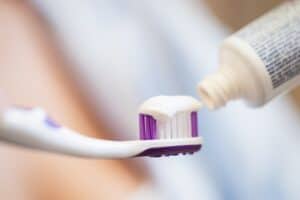
17 Sep The Role of Nutrition in Dental Health: Best Foods for a Strong Smile
Choosing Foods for a Healthy Smile
Did you know the food you eat has a direct impact on the health of your teeth and gums? Your dental health is more than just brushing and flossing – what you consume daily plays a huge role in keeping your smile bright and strong.
From building strong enamel to preventing gum disease, a well-rounded diet is the foundation for excellent oral health. In this month’s blog post, we will take a look at how nutrition impacts your dental health and what foods are best for maintaining that radiant smile.
How Nutrition Impacts Dental Health
When you think about oral hygiene, toothbrushes, toothpaste, and dental checkups probably come to mind. But did you know that the nutrients in your food are just as important for maintaining your oral health?
Your teeth and gums need a variety of vitamins, minerals, and other nutrients to stay strong. For instance, calcium helps strengthen your teeth, while Vitamin C keeps your gums healthy.
On the flip side, poor dietary choices can lead to issues like cavities, gum disease, and enamel erosion. A diet high in sugar and acidic foods can erode the enamel – the hard, outer surface of your teeth – leaving them vulnerable to decay.
Essential Nutrients for Strong Teeth
Calcium: The Foundation for Strong Teeth
Calcium is a key building block for strong teeth and bones. It helps maintain the hardness of your tooth enamel, which protects your teeth from decay. Dairy products like milk, cheese, and yogurt are excellent sources of calcium. If you’re lactose intolerant, look for fortified plant-based milk or leafy greens like kale.
Vitamin D: Supporting Calcium Absorption
Vitamin D works hand-in-hand with calcium by helping your body absorb this vital mineral. Without enough Vitamin D, your teeth may not get the calcium they need to stay strong. Fatty fish like salmon and tuna, as well as fortified foods, are great sources of Vitamin D.
Phosphorus: Partner to Calcium for Enamel Health
Phosphorus helps protect and rebuild tooth enamel. It works alongside calcium to maintain the health of your teeth. You can find phosphorus in meat, eggs, dairy, and fish.
Vitamin C: Supporting Healthy Gums
While calcium and phosphorus strengthen your teeth, Vitamin C plays a critical role in maintaining your gum health. It helps prevent inflammation and strengthens the connective tissue that holds your teeth in place. Citrus fruits, strawberries, and bell peppers are rich in Vitamin C.
Vitamin A: Keeping Mucous Membranes Healthy
Vitamin A helps keep the mucous membranes in your mouth healthy, preventing dry mouth and other oral issues. Foods like carrots, sweet potatoes, and spinach are packed with Vitamin A.
Fluoride: Strengthening Tooth Enamel
Fluoride is well-known for its role in preventing tooth decay. It strengthens tooth enamel and makes it more resistant to acid attacks. While many toothpastes contain fluoride, you can also get it from tap water and certain teas.

Best Foods for Dental Health
Dairy Products: Calcium and Vitamin D Boosters
Milk, cheese, and yogurt are excellent sources of calcium and Vitamin D, both of which are vital for strong teeth. These dairy products help build and maintain tooth enamel, reducing the risk of decay.
Additionally, cheese increases saliva production, which helps wash away food particles and neutralizes acids in the mouth. Including a variety of dairy products in your diet ensures that you get a consistent supply of these important nutrients.
Leafy Greens: Nutrient-Packed Powerhouses
Leafy greens like spinach and kale are packed with vitamins and minerals, including calcium and Vitamin C. They help protect both your teeth and gums while providing a low-calorie, nutrient-dense option for your diet.
The high fiber content in these vegetables also promotes good digestion and overall health. Incorporating a variety of leafy greens into your meals can boost your intake of essential nutrients for a healthy mouth.
Crunchy Vegetables and Fruits: Natural Toothbrushes
Crunchy fruits and veggies like apples, carrots, and celery act like natural toothbrushes. Their texture helps scrub away plaque while stimulating saliva production, which neutralizes acids in the mouth.
Eating these foods regularly can help reduce the risk of cavities and keep your teeth clean. They also provide a refreshing, healthy snack option that supports both oral and overall health.

Nuts and Seeds: Protein and Essential Fats
Almonds, walnuts, and flaxseeds are rich in calcium and phosphorus, helping to maintain your enamel. They’re also a good source of protein, which is crucial for overall health and tissue repair.
Nuts and seeds contain healthy fats that support cell function and improve nutrient absorption. Snacking on these nutrient-packed foods can contribute to a balanced diet and promote strong, healthy teeth.
Fish: Packed with Phosphorus and Vitamin D
Foods to Avoid for Optimal Dental Health
Sugary Foods and Beverages
It’s no surprise that sugar is bad for your teeth. Bacteria in your mouth feed on sugar, producing acids that attack your enamel. Limit your intake of sugary snacks and drinks like candy, soda, and sweetened juices to prevent cavities.
Acidic Foods and Drinks
Acidic foods and beverages like citrus fruits, wine, and soda can erode enamel over time. While some acidic foods, like oranges, are also rich in Vitamin C, it’s important to consume them in moderation and rinse your mouth with water afterward.
Sticky and Chewy Candies
Candies that stick to your teeth, like caramel and taffy, are particularly harmful because they can get lodged in hard-to-clean areas. The longer sugar stays in contact with your teeth, the higher the risk of decay.
Simple Tips for a Nutrient-Rich Diet for Dental Health




Sorry, the comment form is closed at this time.